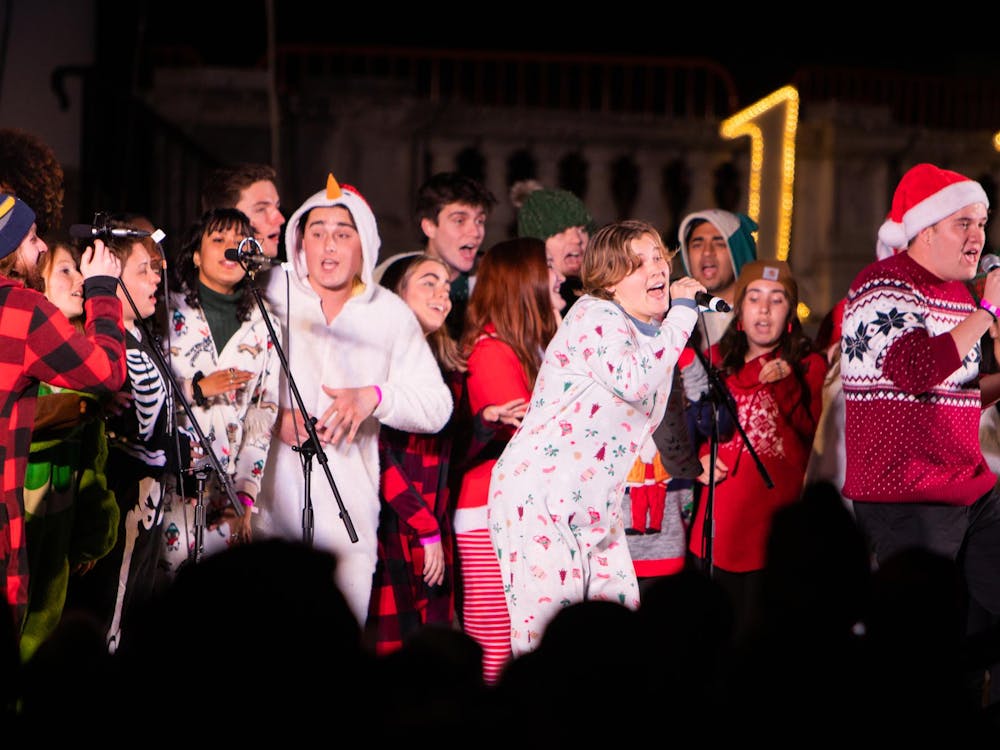The house lights dim. Old Cabell Hall is a sea of expectant faces, all watching an artist, all waiting to be wowed by his or her exceptional talent. The culmination of several years of music study finally has arrived.
Near the end of each year, graduating University students hold individual senior recitals, hoping to display their musical prowess to all who lend an ear.
"Last semester we did a lunchbox recital in this hall, so I got a feeling for being on the stage, looking out at the audience," fourth-year College student Agnes Liou said, her wide-set eyes taking in the stage of Old Cabell Hall.
Liou began singing in choruses in middle school but spent high school concentrating on the violin. It was not until she came to the University and joined the University Singers that she realized her true love was for voice.
"If I could have everything that I want, I would want to perform," Liou said, explaining that she will go on to DePaul University in Chicago next year to work towards a master's degree in vocal performance.
Like most music students, however, she realizes that it will be an uphill battle because she may end up teaching most of the time.
Liou, whose voice recital will take place May 1, said that while she is more excited than intimidated by the idea of her recital, she realizes that a little bit of nerves is important.
"You never want to lose that edge of being nervous because that's what keeps you on your toes," Liou said. "I don't think I ever want to get to a point where I walk onstage and I'm so comfortable that's it's like, 'Oh, it's just another performance.'"
Unlike most students giving final recitals this semester, Liou is not majoring in music. Instead, she is a double major in economics and cognitive science.
Most music majors use a final recital as a way to earn a distinguished major, or simply as a way to show what they have accomplished during their period of musical refinement at the University.
"I would try to encourage any other non-music major to do something like this," Liou said. "To me, it's kind of proving a point to myself and to my friends and family, presenting to them what I do. It's very exciting, the kind of adrenaline you get when you're on stage, because you want to say something and people are there because they want to hear you."
Accompanying Liou in her recital, as well as giving two recitals of his own, is graduate student Jay DeWire. Unlike the other performers this semester, however, he has already completed his undergraduate studies, and this time he will earn an M.A. in music.
For his first two years at the University, DeWire focused on pre-Commerce School curriculum, and it was not until the end of his second year that he switched to a music and English major.
"My first two years I didn't play piano at all," DeWire said. "It's sort of a late start to start looking at music seriously at age 20, so I planned on staying here another year and continuing to take lessons."
It was actually during a dress rehearsal for his undergraduate recital that DeWire realized that getting his M.A. could be a possibility.
"We eventually just made up this two-year performance program," DeWire said. "I think it's really good because it gave me two more years to incubate."
Next year, DeWire will be attending the New England Conservatory, where he hopes to showcase the skills that he has practiced for hours to master.
Yet, DeWire admits that no matter how practiced musicians are for their first on-stage performances, all the little things will go wrong and will add to the initial stress.
"I had major clothes issues that night," DeWire said of his first performance. "The top button on my tuxedo shirt broke, my tie wouldn't tie, I realized I was wearing one blue sock and one bright purple sock, and one of my cuff links broke."
Luckily for DeWire, audience members were situated on the left side of the auditorium to be able to see the pianist's fingers, and it happened to be the opposite side of the broken cuff link.
While DeWire found it beneficial for the audience to sit on the left side of the auditorium, limiting his fashion embarrassment, fourth-year College student Sylvia Shaefer saw it as a problem.
"Since all the audience sat on the left side of the auditorium, when I was walking out I saw that the right side of the auditorium was empty and I thought, 'Oh my goodness, there's nobody here,'" Shaefer said.
Shaefer began playing flute her junior year of high school - after she was kicked out of her piano teacher's studio for refusing to practice.
"I came to the University wanting to major in music, but music isn't exactly the economically secure major to choose, so I decided to pick something else," Shaefer said, explaining that she ended up double majoring in music and environmental science.
Despite being intimidated by the thought of performing in front of an auditorium of people, Shaefer realizes that it is all part of the job.
"I'm getting to the point where I'm really enjoying performing, so eventually it was alright being up there," Shaefer said.
Like many of the other students, Shaefer was thankful for the opportunity to play in Old Cabell Hall. The hall must be reserved almost a year in advance of performance dates, and those who are not music majors must pay to rent it out for recitals.
"I originally was going to do it in Garrett Hall, but I got lucky and Old Cabell was still open," she said. "Acoustic-wise it's really good, it's the music building, it's a little bit nicer stage, and your audience isn't on folding chairs."
To those who have not yet performed, Shaefer's advice was to "practice and have fun with it. Be confident."
Fourth-year College student Tom Mulherin, whose jazz piano recital will take place April 13, has an added dimension of pressure and pride in that he composed nine of the 10 pieces he will perform with his hand-picked jazz ensemble.
"It'll be interesting to see how an audience responds to my music presented together, where it's not sandwiched as a part of a larger program," Mulherin said. "It'll tell me a lot about whether the music can stand up on its own."
Mulherin cited Bud Powell, Wayne Shorter and University Performance Faculty member John D'Earth as major influences on some of his pieces. He also said that the quality of the musicians he will play with has helped to soothe his nerves.
"I was nervous, but then we started rehearsals for it, and I'm just so psyched about the musicians I'm playing with that it's really going to make it a lot of fun," he said.
And even if something does go wrong, as in DeWire's case, performers should take it in stride.
"I heard someone in the audience say, 'Why is he only wearing one sock?'" DeWire said. "But in the same way that football players just go out and throw around a football sometimes, performing is sort of the same. It's something you just sit down and do"




